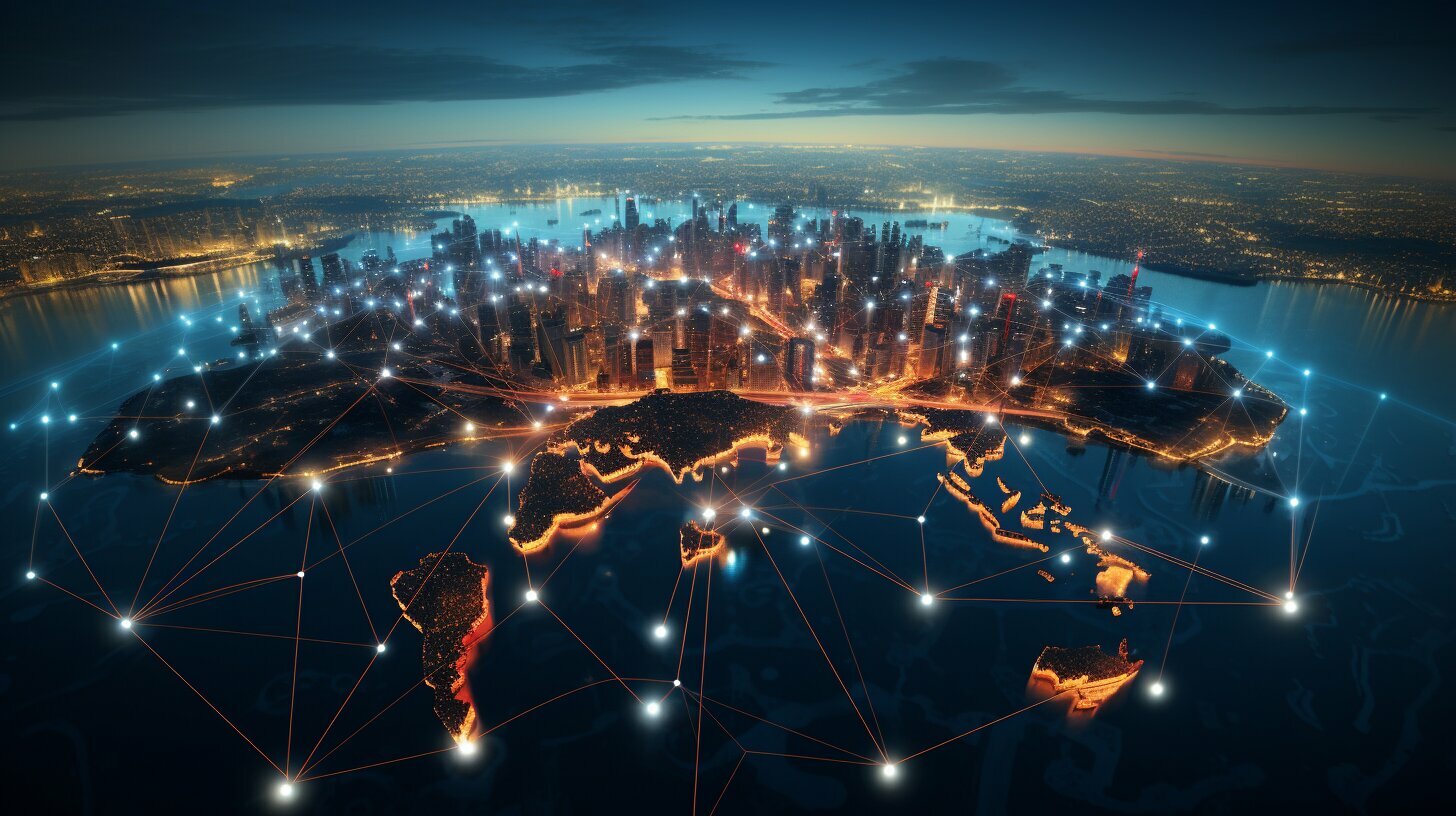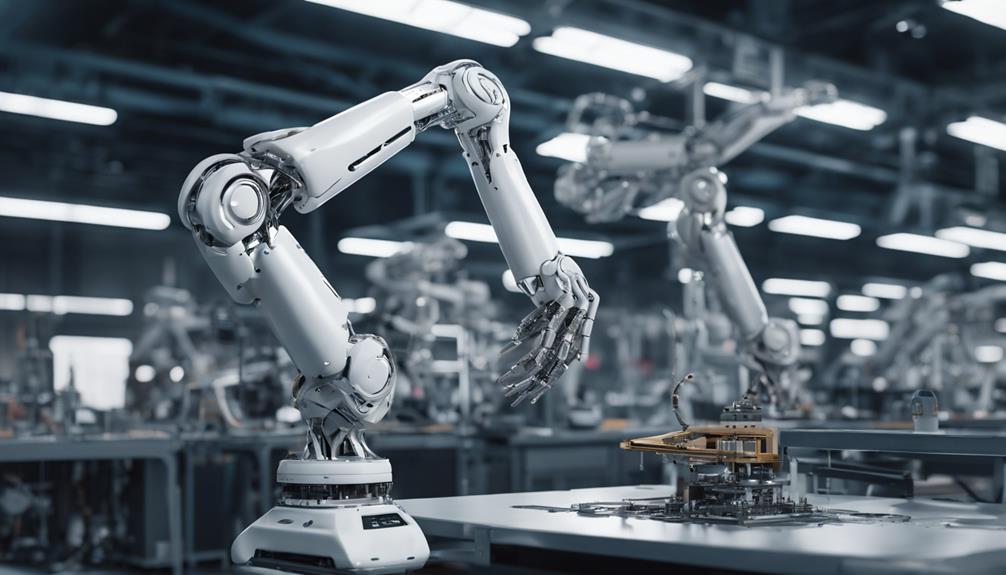Artificial intelligence (AI) is profoundly changing the way we live, shaping the advancement of technology and determining the path of our collective future. With the ability to analyze data, make informed decisions, and act accordingly, AI is transforming various industries, propelling us into a new era of creativity and progress. From finance to healthcare, and from transportation to national security, the impact of AI on a global scale cannot be denied.
As we witness the rise of AI, it’s important to understand its applications and predictions, while also considering the ethical, regulatory, and privacy concerns that come with it. AI is not just a buzzword; it represents a profound shift in how we approach technology and automation.
Key Takeaways:
- AI is transforming industries and reshaping our world through technology advancements.
- It has a global impact across various sectors, from finance to healthcare, transportation to national security.
- Understanding the ethical, regulatory, and privacy concerns is crucial for responsible AI adoption.
- AI predictions and applications offer immense potential for economic growth and digital transformation.
- Machine learning and automation are key drivers in the future of AI.
The Qualities of Artificial Intelligence
Artificial intelligence (AI) possesses several qualities that make it a powerful and transformative technology. These qualities include intentionality, intelligence, adaptability, and the ability to analyze data through AI algorithms and machine learning.
One of the key qualities of AI is its intentionality. AI systems make decisions based on real-time data and information from various sources, enabling them to respond and adapt to changing situations. This quality allows AI to optimize processes and generate insights that help improve decision-making in various industries.
Additionally, AI algorithms are designed to be intelligent. Through machine learning and data analysis, AI systems can identify patterns, learn from past experiences, and make informed decisions. This intelligence enables AI to solve complex problems and provide innovative solutions that may not be possible with traditional approaches.
Furthermore, AI showcases adaptability as it learns and improves its decision-making abilities with more experience. This quality allows AI to continuously grow and evolve, providing increasingly accurate and efficient solutions over time. By continuously learning and adapting, AI can address new challenges and contribute to advancements across industries.
To summarize, the qualities of AI, including intentionality, intelligence, adaptability, and the ability to analyze data, make it a versatile and powerful tool that can drive innovation and solve complex problems across various sectors.
Applications of AI in Diverse Sectors
In today’s rapidly evolving world, artificial intelligence (AI) is making its mark across various sectors, revolutionizing the way we live, work, and interact. From finance to national security, healthcare to manufacturing, transportation to smart cities, AI is being integrated into diverse industries to drive innovation and enhance efficiency. Let’s explore some of the exciting applications of AI in these sectors.
Finance
In the finance industry, AI is transforming traditional processes and paving the way for more accurate and efficient decision-making. AI-powered algorithms are used to analyze vast amounts of financial data, enabling banks and financial institutions to make informed lending decisions and detect fraudulent activities. Additionally, AI-driven robo-advisors are providing personalized investment recommendations to individuals, enhancing the accessibility of financial services.
National Security
AI is playing a crucial role in national security by aiding in threat detection, intelligence analysis, and defense planning. Advanced data analysis techniques and machine learning algorithms enable security agencies to analyze large volumes of data from diverse sources, identifying patterns and anomalies that human analysts may overlook. This empowers governments to proactively respond to emerging threats, ensuring the safety and security of nations.
Healthcare
The healthcare sector is harnessing the power of AI to enhance patient care, diagnosis, and research. AI algorithms can process medical images, helping doctors detect diseases such as cancer at early stages with greater accuracy. AI-powered chatbots and virtual assistants provide 24/7 support to patients, answering their queries and guiding them towards appropriate medical resources. Furthermore, AI is facilitating drug discovery, accelerating the development of new treatments and therapies.
Table: Applications of AI in Diverse Sectors
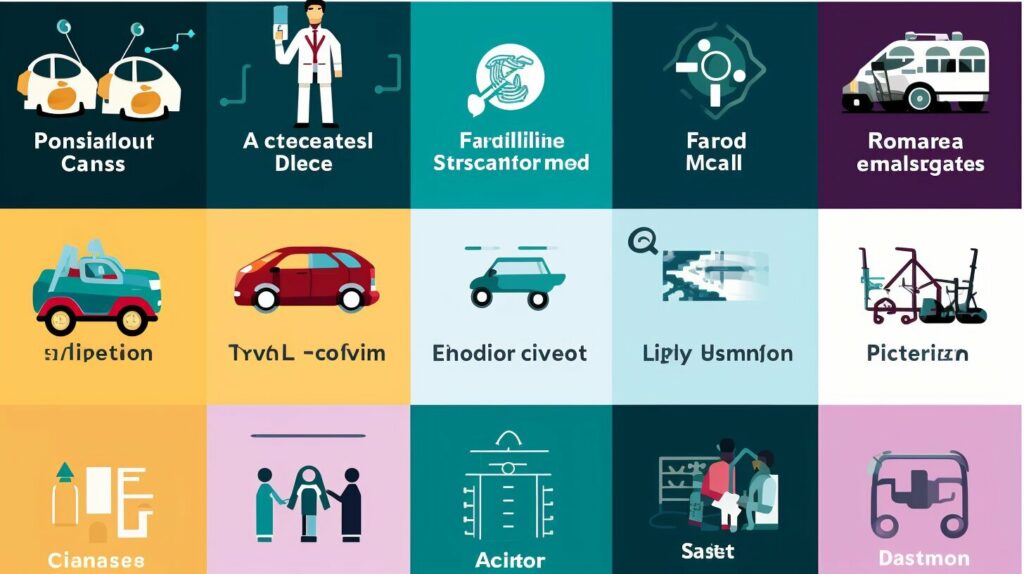
As shown in the table above, AI is transforming multiple sectors, offering innovative solutions and driving progress. From revolutionizing financial services to bolstering national security, improving healthcare outcomes to creating smarter cities, the possibilities for AI applications are vast and promising.
With ongoing advancements in AI technology and greater integration into various industries, we can expect to witness even more exciting applications and transformative impact in the years to come. AI is truly shaping the future of our world, and it is an exciting time to be part of this technological revolution.
The Economic Impact of AI
AI is not just a technological advancement; it is also a major driver of economic growth and development. Studies project that the integration of AI technologies could increase the global GDP by trillions of dollars in the coming years. The economic potential of AI is vast, and countries around the world are recognizing its significance and investing heavily in AI research and development.
One country that stands out in the AI market is China. With its robust investments in AI, China is positioning itself as a global leader in this field. The Chinese government has set ambitious goals to become a world leader in AI innovation and application by 2030. This commitment is backed by substantial funding, leading to the development of cutting-edge AI technologies and the creation of a thriving AI ecosystem in the country.
The economic impact of AI extends beyond the technology sector. AI adoption in various industries such as finance, healthcare, manufacturing, and transportation is expected to drive productivity gains and create new business opportunities. For example, AI-powered automation can streamline manufacturing processes, reduce operational costs, and enhance product quality. Similarly, AI applications in healthcare can improve patient outcomes, accelerate drug discovery, and enhance diagnostic accuracy.
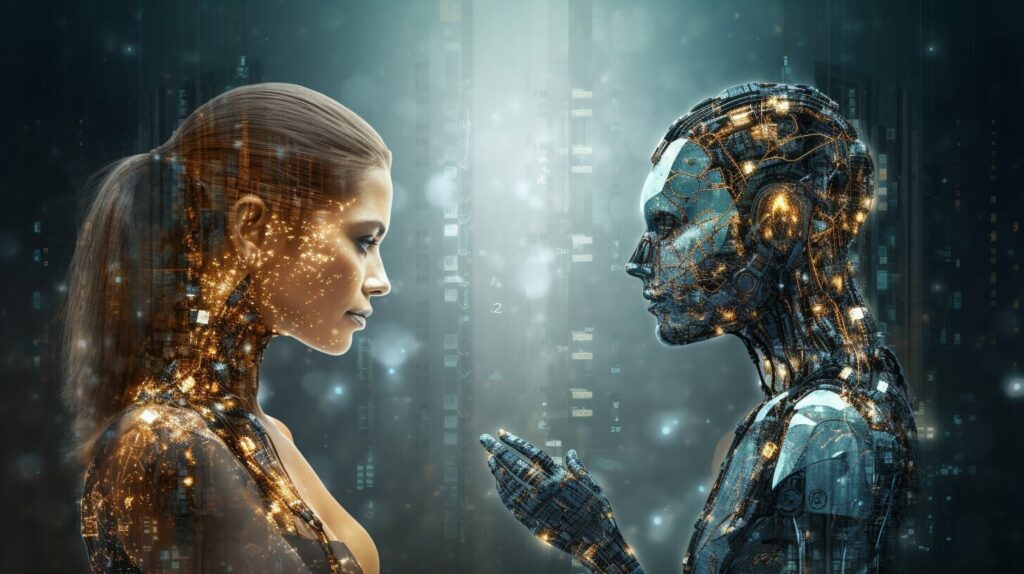
Table: Economic Impact of AI in Different Sectors
| Sector | Economic Impact |
|---|---|
| Finance | Affordable loan decisions, robo-advisors, fraud detection |
| Healthcare | Disease diagnosis, drug discovery, patient monitoring |
| Manufacturing | Automated tasks, predictive maintenance |
| Transportation | Self-driving cars, travel planning optimization |
| Other sectors | Improved decision making, efficiency, and innovation |
The economic impact of AI is undeniable, but it also presents challenges. The widespread adoption of AI may result in job displacement and transformations, as certain tasks become automated. However, history has shown that technological advancements often create new job opportunities. To fully harness the economic benefits of AI, there is a need for continuous education and skills development to ensure that individuals can adapt and thrive in the AI-powered economy.
The Impact of AI on Jobs and Employment
The rapid advancement of artificial intelligence (AI) technology has sparked concerns about its impact on jobs and employment. As AI continues to automate routine and repetitive tasks, there are fears of widespread job displacement. However, the future of work in an AI-powered world is not as bleak as it may seem. While some jobs may indeed be replaced, AI also has the potential to create new job opportunities and transform existing roles.
Job displacement: It is true that AI has the potential to eliminate certain jobs that involve repetitive tasks and can be automated. However, history has shown that technological advancements often lead to the creation of new jobs. Workers who may be displaced by AI can be retrained and upskilled to take on new roles that require critical thinking, creativity, and emotional intelligence – skills that are difficult to replicate with AI.
Job transformation: Instead of completely replacing jobs, AI is more likely to transform them. By automating repetitive tasks, AI can free up human workers to focus on more complex and strategic aspects of their roles. This shift can lead to job enrichment, as workers can engage in more meaningful and fulfilling work that requires uniquely human skills such as empathy, communication, and problem-solving.
“AI will create as many jobs as it displaces, if not more, by generating economic growth and providing new opportunities for innovation and entrepreneurship.” – Andrew Ng, AI researcher and entrepreneur
Retraining and upskilling: To navigate the changing job landscape in the era of AI, it is crucial to invest in retraining and upskilling programs. This will ensure that workers have the necessary skills to adapt to new roles that emerge as a result of AI integration. Governments, educational institutions, and businesses all have a role to play in providing opportunities for lifelong learning and equipping individuals with the skills needed to thrive in the future of work.
| Impact of AI on Jobs | Summary |
|---|---|
| Job displacement | Some jobs may be automated, but new jobs can be created through technological advancements. |
| Job transformation | AI can transform existing roles by automating repetitive tasks, allowing workers to focus on more complex and strategic aspects. |
| Retraining and upskilling | Investing in retraining and upskilling programs is crucial to ensure workers have the skills to adapt to the evolving job landscape. |
While the impact of AI on jobs and employment is a topic of ongoing debate, it is important to approach it with a balanced perspective. AI has the potential to enhance productivity, drive innovation, and create new opportunities for economic growth. By proactively addressing the challenges and investing in the necessary education and skills development, we can create a future where AI and human workers coexist harmoniously, leveraging their respective strengths to shape a more prosperous and inclusive society.
Ethical and Regulatory Considerations for AI
As AI continues to make significant advancements and become more integrated into our daily lives, it is crucial to address the ethical and regulatory considerations associated with its adoption. Transparency and fairness in AI decision-making processes are vital in building trust and ensuring the responsible use of AI technologies.
One of the key ethical concerns is algorithmic bias, where AI systems can unintentionally perpetuate biases and discrimination present in the data they are trained on. Efforts must be made to mitigate these biases and ensure that AI algorithms are designed and implemented in a way that promotes fairness and inclusivity.
Regulatory frameworks play a crucial role in guiding the development and deployment of AI technologies. These frameworks need to address issues such as data privacy, accountability, and potential societal impact. It is important to strike a balance between enabling innovation and protecting individuals’ rights and welfare.
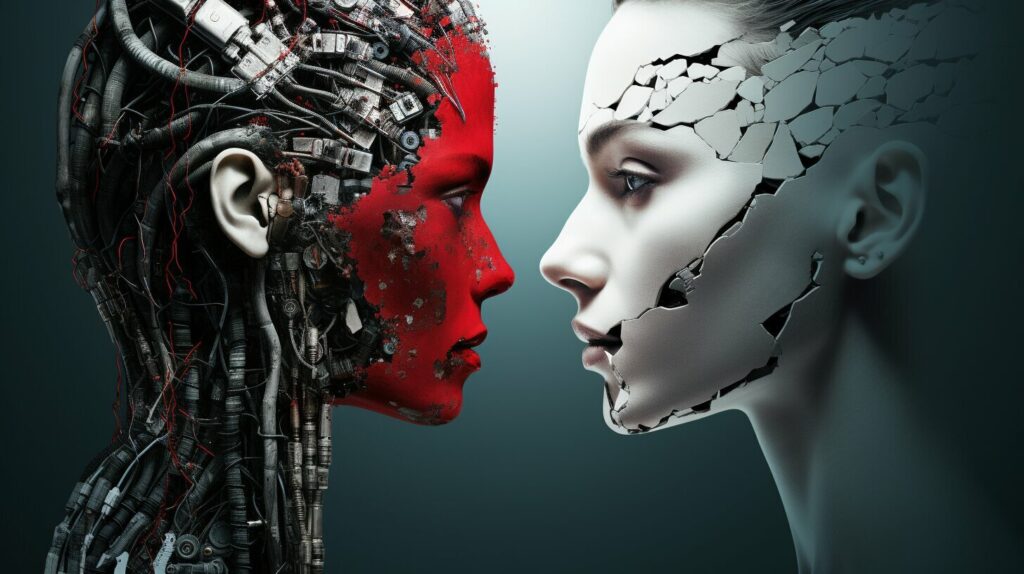
The responsible and transparent use of AI requires organizations and policymakers to establish clear guidelines and standards. These guidelines should promote AI transparency, ensuring that individuals understand how AI systems operate and the implications of their decisions. Open dialogue and collaboration between stakeholders are essential in developing effective regulatory frameworks that foster the ethical and responsible adoption of AI.
As AI technologies continue to evolve, ongoing assessment and adaptation of ethical and regulatory frameworks will be necessary to keep pace with the rapid advancements in this field. By addressing ethical considerations and establishing robust regulatory frameworks, we can harness the potential of AI while upholding values such as fairness, transparency, and privacy.
The Future of AI: Opportunities and Challenges
As we look ahead to the future of AI, we can expect to see continued advancements and integration of this transformative technology. AI predictions indicate that it will become even more integrated into our daily lives, with applications ranging from healthcare and finance to transportation and smart cities. However, along with the opportunities AI presents, there are also challenges that need to be addressed.
One of the key challenges in AI development is ensuring ethical considerations are at the forefront. As AI algorithms become more complex and influential, it is crucial to establish ethical frameworks that guide their use. This includes addressing algorithmic bias, ensuring transparency in AI decision-making processes, and protecting user privacy. By addressing these challenges, we can build trust and ensure that AI is used in a responsible and beneficial manner.
The societal impact of AI is another important consideration. While AI has the potential to improve productivity and create new job opportunities, it may also lead to job displacement. It is essential to address the impact of AI on jobs and work towards retraining and upskilling initiatives to ensure that individuals can adapt to the changing job landscape. By investing in education and skills development, we can equip people with the tools they need to thrive in an AI-powered world.
In summary, the future of AI holds immense potential for transforming various industries and improving decision-making processes. However, we must navigate the challenges of ethical considerations, societal impact, and job displacement. By doing so, we can harness the full potential of AI while ensuring its responsible and beneficial adoption.

Table: AI Predictions
| Prediction | Impact |
|---|---|
| AI integration in healthcare | Improved disease diagnosis, personalized treatment, and drug discovery. |
| Automation in manufacturing | Increase in productivity, reduced costs, and predictive maintenance. |
| AI-powered transportation | Advancements in self-driving cars, optimized travel planning, and traffic management. |
| Sustainability with AI | Energy optimization, resource management, and environmental monitoring in smart cities. |
The Role of AI in Sustainable Development
AI has the potential to play a significant role in driving sustainable development and addressing pressing global challenges such as climate change and environmental impact. By leveraging AI technologies, we can develop innovative solutions to optimize resource management, improve energy efficiency, and create smarter cities.
One of the key areas where AI can contribute to sustainable development is in the field of climate change. AI-powered data analysis and modeling can provide insights into climate patterns, helping us understand the complex interactions between various factors and develop effective strategies for mitigation and adaptation. By harnessing the power of AI, we can enhance our understanding of climate change and make informed decisions to reduce its impact.
Smart cities, enabled by AI technologies, are another critical aspect of sustainable development. AI can be used to optimize energy consumption, reduce pollution, and improve urban planning. By analyzing data from various sources, AI-powered systems can provide real-time insights for efficient resource management, transportation planning, and infrastructure development. Smart cities equipped with AI can create more livable and environmentally-friendly urban environments.
The Role of AI in Sustainable Development
“AI has the potential to contribute to sustainable development by addressing challenges such as climate change and resource management.”

| AI Applications in Sustainable Development | Benefits |
|---|---|
| Climate Change Modeling and Prediction | – Improved understanding of climate patterns – More accurate predictions for mitigation and adaptation |
| Resource Optimization | – Efficient use of energy, water, and other resources – Reduced waste and environmental impact |
| Sustainable Urban Planning | – Smart infrastructure development – Enhanced transportation systems – Improved quality of life |
As we continue to harness the power of AI, it is vital to ensure that its deployment aligns with ethical considerations and safeguards against potential negative consequences. Ethical guidelines and regulatory frameworks should be developed to govern the responsible and transparent use of AI technologies in sustainable development efforts.
By leveraging the potential of AI in sustainable development, we can create a more resilient and environmentally-friendly future. The intelligent applications of AI can help us address complex challenges, make better decisions, and achieve progress towards a more sustainable world.
The Importance of AI Education and Skills Development
In today’s rapidly evolving world, AI education and skills development are becoming increasingly essential. As AI continues to transform various industries, individuals with AI literacy, coding abilities, and adaptive skills will be well-equipped to thrive in the future job market. It is crucial to prioritize AI education and skills development to ensure that we can harness the full potential of this technology.
AI literacy plays a significant role in enabling individuals to understand the capabilities and limitations of AI. By gaining a comprehensive understanding of AI concepts and principles, we can make informed decisions about its applications and navigate its ethical implications. Additionally, coding skills are becoming increasingly valuable as AI becomes more integrated into our daily lives. The ability to develop, maintain, and optimize AI algorithms and models will be in high demand, driving career opportunities in fields related to AI development and implementation.
Retraining programs and initiatives are also essential to support individuals in adapting to the changing demands of the AI-powered world. As AI automates routine and repetitive tasks, it is crucial to provide opportunities for workers to acquire new skills and transition into roles that require human judgment, creativity, and critical thinking. By investing in retraining programs, we can ensure that individuals are equipped with the necessary skills to remain relevant and competitive in the job market.
Overall, AI education and skills development are fundamental for individuals and organizations alike. By fostering AI literacy, coding abilities, and providing retraining opportunities, we can empower individuals to embrace the potential of AI and contribute to its responsible and beneficial adoption. Investing in AI education and skills development is key to building a workforce that is prepared for the challenges and opportunities of the AI-powered future.

The Benefits of AI Education and Skills Development
- Enhanced understanding of AI concepts and principles
- Increased job opportunities in fields related to AI development and implementation
- Improved adaptability to the changing job landscape
- Empowerment to make informed decisions about AI applications and ethical implications
- Increased competitiveness in the job market
The Role of Retraining Programs
“Retraining programs are crucial for enabling workers to acquire new skills and transition into roles that require human judgment, creativity, and critical thinking in the AI-powered world.”
The Importance of AI Literacy
“AI literacy provides individuals with the knowledge and understanding necessary to navigate the potential of AI and make informed decisions about its applications and ethical considerations.”
| Key Skills for AI Education and Development | Description |
|---|---|
| AI Literacy | Understanding the capabilities and limitations of AI |
| Coding and Programming | Developing, maintaining, and optimizing AI algorithms and models |
| Adaptability | Acquiring new skills and adapting to the changing demands of the AI-powered world |
The Role of AI in Journalism and Media
AI has revolutionized the field of journalism and media, transforming the way news is generated and disseminated. One of the key applications of AI in this industry is AI-generated content, where algorithms analyze data and information to produce news articles, reports, and even social media posts. This automated reporting process has the potential to increase efficiency and productivity, as AI can quickly gather and analyze vast amounts of data to generate tailored content.
However, the impact of AI-generated content on the media industry is a topic of debate. While it offers benefits such as faster news production and increased news coverage, there are concerns about its potential impact on the credibility and quality of news. The role of human journalists and editorial oversight becomes crucial in ensuring that AI-generated content is accurate, unbiased, and upholds journalistic integrity.
AI also plays a significant role in content recommendation and personalization. Algorithms analyze user data and preferences to deliver personalized news content to individuals, creating a more tailored news consumption experience. This allows media organizations to better engage their audience and deliver targeted advertisements, but it also raises concerns about privacy and the potential for creating filter bubbles.
In conclusion, AI has brought about transformative changes in journalism and media. While AI-generated content and personalized news consumption offer advantages in terms of efficiency and relevance, it is important to strike a balance between AI assistance and human editorial oversight. By leveraging the strengths of AI while preserving journalistic integrity, we can navigate the evolving media landscape and ensure that the role of journalism remains essential in providing accurate, reliable, and ethical news to the public.
Conclusion
AI is transforming the world in numerous ways, shaping various sectors and industries. The future of AI holds immense potential for economic growth, improved decision making, and sustainable development. However, as we embrace this technological advancement, we must also address the challenges it presents.
Responsible AI adoption is crucial to ensure that ethical considerations are taken into account. We must prioritize the development of regulatory frameworks that promote transparency, fairness, and accountability. By doing so, we can mitigate the risks associated with AI and maximize its positive impact on society.
Furthermore, the future of AI will likely bring changes to the job market. While there may be concerns about job displacement, history has shown that societies can adapt and create new opportunities in response to technological advancements. Investing in education and skills development, including AI literacy and coding, will empower individuals to thrive in the AI-powered world.
As we navigate the ongoing advancements and integration of AI, collaboration between stakeholders is key. By working together, we can ensure that AI is harnessed for the benefit of society as a whole. With careful consideration and responsible adoption, we can shape a future where AI transforms the world for the better.
FAQ
How is AI transforming the world today?
AI is transforming the world by enabling better integration of information, analyzing data, and improving decision making. It has applications in various sectors such as finance, national security, healthcare, manufacturing, transportation, and more.
What are the qualities of artificial intelligence?
AI exhibits intentionality by making decisions based on real-time data and information, it leverages machine learning and data analysis to be intelligent, and it demonstrates adaptability by learning and improving its decision-making abilities.
In which sectors is AI being utilized?
AI is being integrated into sectors such as finance, national security, healthcare, manufacturing, transportation, smart cities, and more.
What is the economic impact of AI?
AI technologies have the potential to increase the global GDP by trillions of dollars, with China leading in AI investment. Companies are investing billions of dollars in AI products and services, driving economic growth and advancements.
What is the impact of AI on jobs and employment?
AI has the potential to automate routine tasks but can also create new job opportunities. Retraining and upskilling are necessary to adapt to the changing job landscape.
What are the ethical and regulatory considerations for AI?
Ethical considerations for AI include addressing algorithmic bias, ensuring transparency, privacy, and accountability. Regulatory frameworks are necessary to ensure responsible and ethical AI development and deployment.
What does the future hold for AI?
The future of AI involves continued advancements, integration into daily lives, and challenges such as ethical concerns, job displacement, and managing the impact on society. Collaboration among stakeholders is crucial for navigating these challenges and harnessing AI’s potential.
How does AI contribute to sustainable development?
AI can address challenges such as climate change and resource management through smart city initiatives. It optimizes energy consumption, reduces pollution, and supports environmentally friendly practices.
Why is AI education and skills development important?
AI education and skills development are crucial for individuals to acquire AI literacy and understand the capabilities and limitations of AI. This includes learning programming and coding skills to adapt to the future job market.
What is the role of AI in journalism and media?
AI is being utilized in journalism and media through tools like ChatGPT and automated reporting systems. While it can increase efficiency, there is a need to strike a balance between AI assistance and human editorial oversight to maintain quality and preserve journalistic integrity.
How is AI transforming the world?
AI is transforming the world by offering economic growth, improved decision making, sustainable development, and facing challenges that need to be addressed responsibly.
